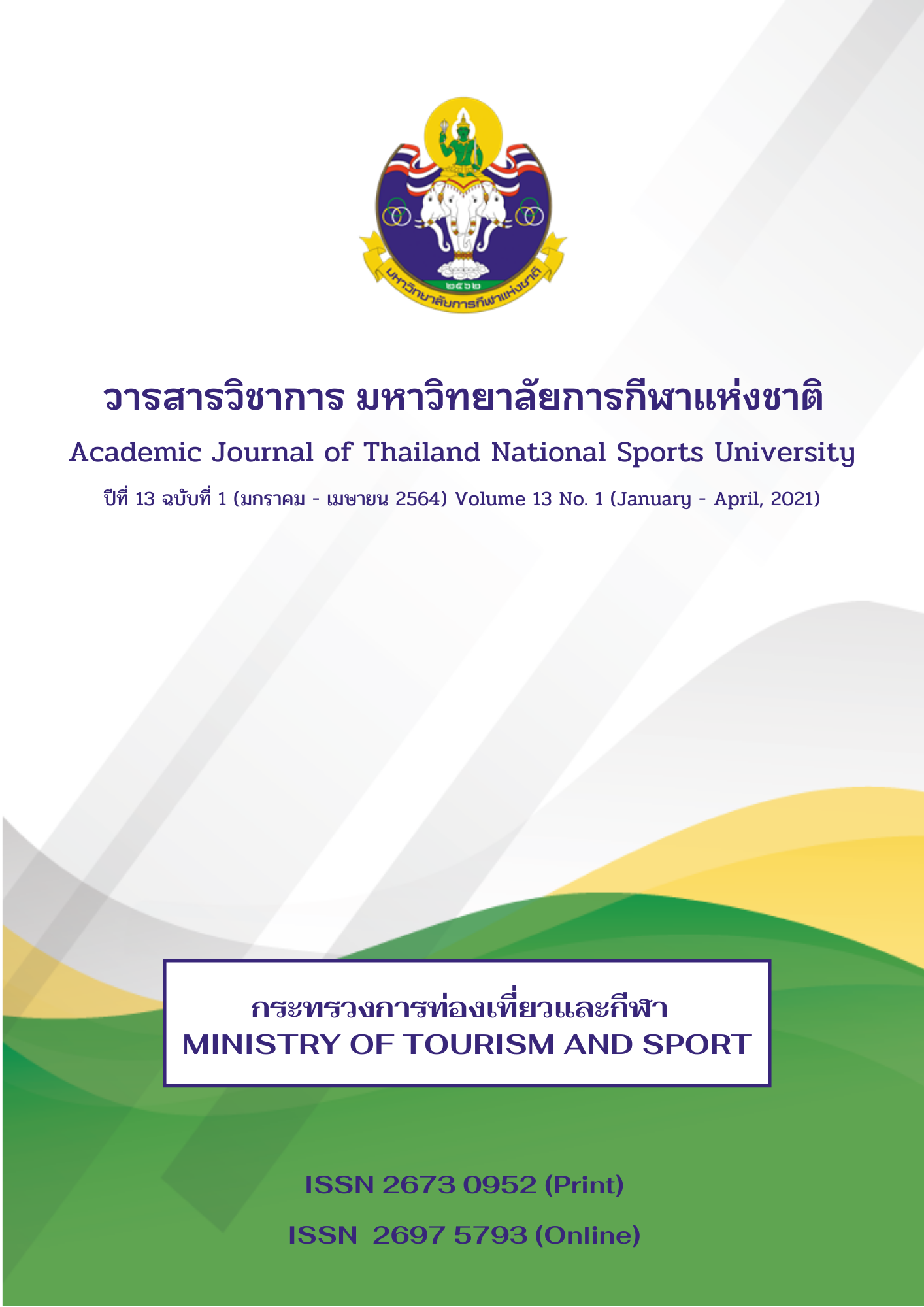DEVELOPMENT OF UNIVERSITY STUDENTS’ HAPPINESS ENHANCEMENT PROGRAM
Main Article Content
Abstract
The purpose of this research was to develop a university students’ happiness enhancement program. The research methodology was divided into 4 phases, which were phase 1, reviewing of the research literature on the definition of happiness, happiness enhancement program, Social and Emotional Learning theory, and Roy’s Adaptation theory. In phase 2, the contents were analyzed and summarized. A university students’ happiness enhancement program was developed in phase 3. Finally, the quality of the program was analyzed by a panel of 5 experts to evaluate the content validity. After that, the improved program was used for the experiment with 10 less happiness students to check the suitability of the activity, time spent in organizing activities, and then, to improve the program to be complete. The results of the research were as follows: 1. Factors affecting student happiness consisted of 3 factors which were self, institutions, and social. In addition, Social and Emotional Learning Theory with Roy's adaptation theory were appropriate to be used for developing happiness enhancement program. 2. Program components included names, objectives, concepts, procedures, and media. 3. There was 10 activities of the developed program which were 1) Building a relationship 2) Emotional awareness 3) Self-management 4) Building an empathy 5) Responsible decision making 6) Yoga relaxation 7) Self–esteem 8) Open-minded 9) Compassion meditation 10) Social relationship. The duration of the program was 6 weeks, 3 days a week, and 1 hour per day. 4. The developed program had content validity of the components of the activity equal to 1.00. The content validity of 10 activities had an average consistency index equal to 0.90 and the consistency of the activity scheduling program developed was 0.92. The program was determined to enhance a university students’ happiness.
Article Details
The published article is a copyright of the Academic Journal of Thailand National Sports University. The passage appeared in each article in this academic journal is a perspective of each author which is not related to the journal. Each author is required to be responsible for all components of his/her own article. If there are any mistakes, each author must be responsible for those mistakes on his/her own.
References
Ai – choo, O. & Gary, D. B. (2006). Teaching strategies that promote thinking model and curriculum approaches. Singapore: Mcgraw- hill education (Asia).
Bavarian, N. et al. (2013). Using social-emotional and character development to improve academic outcomes: A matched-pair, cluster-randomized controlled trial in low-income, urban schools. Journal of School Health, 83(11), Nov, 771-779.
Collaborative for Academic, Social, and Emotional Learning: CASEL. (2010). Effective social and emotional learning programs: Preschool and elementary school edition. KSA-Plus Communications, Inc.
Department of Mental Health. (2019). Suicide among college students. Retrieved from https://www.bangkokbiznews.com/news/detail/829634
Ercan, Z., Adem, P., & Ali, G. G. (2016). Examining the relation between emotional intelligence and happiness status of wellness trainers. Journal of Education and Learning, 5(3), 159-165.
Kankamol Suwitthayarat. (2014). The study and development of social intelligence for higher education students in the south of Thailand. Suthiparithat, 28(86), Apr-Jun, 126-151.
Kanokwan Wangmanee. (2011). The devopment of happiness in Thai adolescents by Self-health Program (Master’s thesis), Srinakharinwirot University.
Klinchaba Suvarnarong, Phuangphet Kaesornsamut, Noppawan Kumpalasiri, Wanna Kongsuriyanavin, and Kanjana Krongthammachart. (2013). The effects of yoga program on happiness, self-esteem and depressive symptoms in nursing students. Journal of Nursing Science. 31(4), Oct-Dec, 66-78.
Kornkanok Kumkon. (2017). Effects of implementing health promotion program using growth mindset and Pender’s Health Promotion Model on lower secondary school students’ happiness (Master’s thesis), Chulalongkorn University.
Mark, D. H. & Ben, C. (2007). The contribution of social relationships to children’s happiness. Springer Science and Business Media B.V., 10, 1-21.
Office of the National Economic and Social Development Council: NESDC (2019a). The Eighth National Economic and Social Development Plan (1997 - 2001). Retrieved from https://www.nesdb.go.th
Office of the National Economic and Social Development Council: NESDC. (2019b). The Twelfth National Economic and Social Development Plan (2017 - 2021). Retrieved from https://www.nesdb.go.th
Parker, J. D., Summerfeldt, L. D., Hogan M. J., and Majeski S. A. (2004). Emotional intelligence and academic success: Examing the transition from high school to university. Personality and Individual Differences, 36(1), 163-173.
Perry, R. P., Hladkyj Steven, Pekrun Reinhard, and Pelletier Sarah T. (2001). Academic control and action control in the achievement of college students: A longitudinal field study. Journal of Educational Psychology, 93(4), 776-789.
Phanumas Pookpoonsap & Pinkanok Wongpinpetch. (2015). The effect of participation in the emotional quotient development program on optimism of maintenance officers. The Journal of faculty of Applied Arts, 8(2), 132-142.
Richards, D., & Martin, W. E. (2012). The effects of a brief mindfulness intervention on self-compassion among undergraduate college students. Proceeding of the 2012 American Counseling Association Conference (pp. 21-25). San Francisco: CA.
Rovinelli, R. J., & Hambleton, R. K. (1977). On the use of content specialists in the assessment of criterion-referenced test item validity. Dutch Journal of Educational Research, 2, 49–60.
Roy, Sr. C. (1984). Introduction to nursing: An adaptation model. Englewood Cliffs, NJ: Prentice Hall.
Surat Petchnil & Sirina Jitcharat. (2018). A development of learning activities for university students social responsibility enhancement. Silpakorn Educational Research Journal. 10(2), Jul-Dec, 194-210.
Sutapat Pradubkaew. (2014). Effects of life skills program management on ability of coping with emotions of lower secondary school students (Master’s thesis), Chulalongkorn University.
Tatcha Suriyo, Amaraporn Surakarn, & Ujsara Prasertsin. (2016). The developing of group counseling program to enhance the social intelligence for adolescents at risk to depression. Veridian E-Journal, Silpakorn University. 9(1), Jan-Apr, 582-597.
Vinita Kaewkua. (2011). Development of a Causal Model of students’ happiness: A Multiple Group Analysis (Master’s thesis), Chulalongkorn University.


